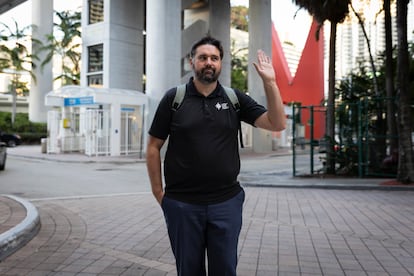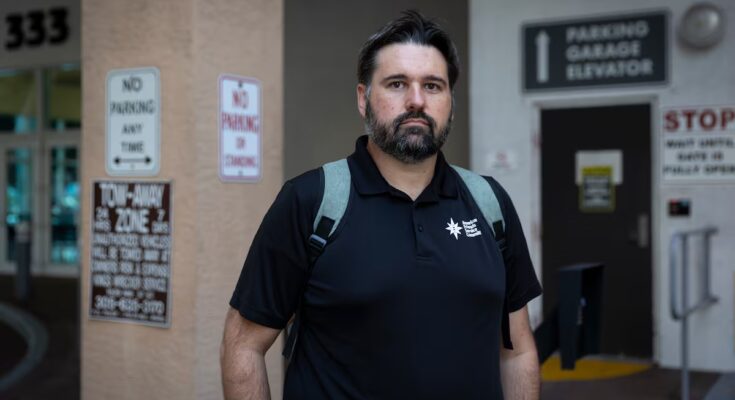Since 7 am, when many go to work or take their children to school, William Botsch has already been on the train heading to the immigration court in center from Miami from his home in Broward County, just over an hour away. Travel has been part of his routine for months. After getting off at Government Center, walk through the noise of construction and car horns to the glass building near the river, pass the metal detectors, and take the elevator to the sixth floor.
He is not summoned to court, but rather goes as an observer for the pro-immigrant organization American Friends Service Committee. It has been doing so since May, when the first reports emerged of arrests in immigration courts, including violent incidents and families separated by masked officers.
In a waiting room where there are several people with clipboards and serious faces, there is a hearing calendar taped to the wall, which Botsch examines carefully, scrolling through the lists of names and nationalities. Then he chooses one, enters silently and sits in the last row.
From there, he has witnessed in recent months how immigration court has become a macabre mechanism perfectly orchestrated to trap people who have sought asylum and attend hearings in good faith. Their cases are dismissed at the request of prosecutors, and once they leave the courtroom, Immigration and Customs Enforcement (ICE) agents wait in the hallway and immediately arrest them.
Botsch, 43, was born in Cayucos, a small coastal town in San Luis Obispo County, California, and moved to Florida in 2019 when his wife found work as a public school teacher. For his part, Botsch carries out his activity in the courts and in the accompaniment and support activities for immigrants almost entirely as a volunteer.
His presence in court — and his subsequent meetings with families of detainees — offers a unique glimpse into a newly developed chaotic law enforcement system that takes place far from public view, where the judgment of judges who have come under pressure from the Donald Trump administration to dismiss cases governs.
This context is clearly reflected in the preliminary hearings, which are collective and take place quickly. There are about twenty people. For most, it is their first time appearing in US court, and many have seen arrests on the news, and know that at any moment their lives can change.
Some have red eyes from crying. Others wipe sweat from their hands.
After group instructions, the judge begins calling each person separately, starting with those who arrived with a lawyer – in person or via video call. Everyone has a new assignment planned in two or three years, according to their own calendar.
The family members present follow the hearing with tension.
What they can’t see is that, meanwhile, outside the room, six ICE agents without uniforms or documents begin to wait. One holds on to tablet which he checks frequently. According to Botsch, officers clear the area and “make everyone go back to the lobby to wait – including the families – to avoid any kind of scene or anything like that.”
In the courtroom, when it is the turn of a man in his 50s, the judge asks him if he needs more time to find a lawyer and announces that he will give him a new assignment for February 2027. Then, a prosecutor from the Department of Homeland Security (DHS), sitting in front of a computer, intervenes to say that “it is not in the best interests of the United States government” to pursue the case and asks that it be dismissed.
These are the key words. If the judge dismisses the case, the man will be arrested after leaving the hearing. The warning shocks the man. The judge explains that if he accepts, when he walks out the door, the Government can subject him to expedited deportation. You can instead ask for 30 days to respond in writing.
The man, holding onto a folder with documents, looks at him perplexed and stammers that he doesn’t understand. Then someone in the audience exclaims, “That!” “That,” he repeats, the option that gives him 30 days. He was saved. Before the hearing ends, the ICE agents are gone.
“There’s so much discretion in the trial that it really depends on the luck of which judge you get,” says Botsch, who took notes during the hearing.
That case will be repeated two more times in that same hearing, all with the same fate. Since May, Botsch has documented more than 170 arrests in Miami court. His notes show a clear pattern: The detainees are men who came to court on their own, mostly newly arrived Cubans who have sought asylum and are now being funneled out of the justice system into expedited deportation.
Court arrests are coordinated days in advance to meet quotas, government agents said The associated presswith little regard for the particular details of each case. Botsch also noticed some patterns among the judges. “Some just say, ‘Okay, your case is dismissed,’ without giving any explanation,” he says. Others carry out an individual case assessment to see if the person could receive some type of protection. Some even offer a voluntary exit.
Immigration courts decide the fate of thousands of people every year, and there is an estimated 3.5 million backlog of cases in the system, as well as a marked shortage of judges. The agency within the Justice Department charged with overseeing them is the Executive Office for Immigration Review (EOIR), which is not part of the judicial branch but of the executive branch, and operates under the attorney general. In recent months, the Trump administration has fired nearly a hundred immigration judges who have been labeled lenient.
During the arrests “there is a lot of confusion,” says Botsch. One day he saw a man who was about to be arrested and grabbed his neck with both hands as if he wanted to strangle himself. “Some people resist or collapse. Family members become desperate. It can be very hard, very difficult to witness,” he explains.
“People totally understand what’s going on. They know what it means to be detained, that it’s like being in prison. It’s horrible,” he says. “A lot of people come from Cuba, from Nicaragua, from Venezuela, and they are really afraid to go back to their country. They think that something could happen to them, that they would be in danger, and the idea is devastating for them,” he adds.
Florida’s immigration detention centers have been singled out by human rights organizations for “dehumanizing” conditions, overcrowding and a lack of transparency. They have also been subject to legal action for failure to respect due process.
Botsch cautions that having an attorney does not necessarily protect someone from having their case dismissed or arrested after leaving the hearing. The only practical difference is that an attorney can more easily file a motion for the person to appear remotely via the court’s Webex system. “If the hearing is by video call, there is no one physically in the room to arrest,” he points out.
Around five in the afternoon, as the courthouse was about to close, Botsch saw officers emerge from a door leading to the garage and load the inmates into an unmarked white minivan. On the days you see the minivan, you know there will be arrests. Seven men were arrested that day, but he doesn’t know by which public. Although he has been in court all day, he regrets that he can only attend one hearing at a time.
Then people start coming to ask about their relatives. Many were not in court and do not know what happened; There have been hours without news. Some took them in their cars and hoped to pick them up later, but couldn’t find them. Others have been waiting in the lobby all day and have yet to receive information. Many are desperate, drowned in tears.
Botsch tries to calm them down with his soft, calm voice. He tells them they’ve probably been arrested and shows them where to stand on the sidewalk to try to see them through the garage gate as they are taken away. “This makes a huge difference: being able to physically see your family member or, in some cases, say hello or blow them a kiss when they load them into the truck,” he says.

He then explains that they will be transferred to the ICE offices in Miramar, north of Miami, and that they will not be able to make a phone call until late at night. He gives them the link to the ICE tracker and explains that, at some point, their family member will appear there and they will be able to see which detention center they have been sent to. It also provides a list of pro bono lawyers and contact details of organizations that help immigrants.
Botsch doesn’t talk about the enormous emotional toll he takes every day. Instead, he cares about others. He says he’s noticed that “whoever is in charge of carrying out this operation is also causing a lot of stress.” “It’s like everyone knows that what they’re doing in court is wrong,” he says. “I’m sure the prosecutors and judges at ICE sense some sort of conflict as well.”
DHS did not respond to a request for comment on this report. EOIR did not respond either.
The Miramar Circle of Protection
On Wednesdays, Botsch doesn’t go to court, but he meets with the “Miramar Protection Circle,” a group of volunteers from various religious and pro-immigration organizations who have met since 2017 in front of the ICE office in that city about 30 kilometers north of Miami.
On the sidewalk they place a table, folding chairs and posters with messages in favor of immigrants, and offer coffee, water and pastries. Among these, the tall and corpulent figure of Botsch stands out, serving coffee to a woman who has been waiting for a family member for several hours.
From there, Circle members observe dozens of people waiting to enter the office across the street. Most come in for a routine annual check-up, but in recent months many have been arrested, volunteers say.
An increase in arrests has been noted in recent weeks. They say some are summoned for the weekend and when they show up they are arrested. They are concerned because some people spend several days held there, as the facility was not designed as a long-term detention center and there are no minimum conditions, such as bathrooms or beds.
Along with the volunteers, some people wait standing anxiously, staring at the door and the parking lot, trying to see their family member. Suddenly, a woman bursts into tears: her partner has just called to say that he has been arrested. Some try to console her, others purse their lips wondering if they will suffer the same fate. Now this happens almost every day. And volunteers like Botsch can only watch in silence.



